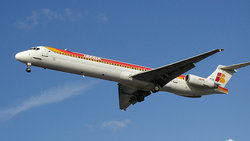Iberia Airlines
|
|
Iberia Airlines of Spain Template:Airline codes, often shortened to Iberia, is the name of the national airline of Spain.
Iberia.a320-214.ec-hdl.750pix.jpg
| Contents |
History
In 2002, Iberia celebrated the 75th anniversary of its founding on June 27 1927 when the airline began scheduled services, making it one of the oldest airlines in the world. During those 75 years nearly 500 million people have flown with Iberia, placing the company among the five largest European airlines, and making Iberia the leader on routes connecting Spain with the rest of Europe, and Europe with Latin America.
In 1946, it became the first European airline to fly to South America and, in 1974, it launched Europe's first walk-on shuttle service, linking Madrid and Barcelona. That same year it established the Serviberia telephone information service, the precursor of today's popular call centres, as well as the 'Red Jackets', uniformed ground staff with the mission of providing special service to customers and to resolve any problems that might arise.
In the late 1980s/early 1990s Iberia planned major fleet renewal with the McDonnell Douglas MD-87, Airbus A320 and Airbus A340 ordered to replace the Douglas DC-9, Boeing 727 and Douglas DC-10 respectively. Significant numbers of the Boeing 757 were also bought.
At this time Iberia also began to build up significant interests in other Spanish airlines - Aviaco, Viva Air, Binter Canarias and Binter Mediterraneo and Latin American airlines - Aerolineas Argentinas, Viasa and Ladeco.
In 1991, Iberia set up Europe's first international airline Frequent-Flyer programme, Iberia Plus, and, in 1996, the airline launched the www.iberia.com website. It bought over Aviaco outright in 1999 and inherited its fleet.
The year 2001 was a watershed year for Iberia, when privatization was completed and Iberia shares were listed on stock exchanges. Thus Spain's flag carrier, which was a public sector enterprise for most of its history, regained its earlier status as a private company. Iberia is an international transportation group, operating in about 100 airports in 40 countries, employing more than 25,000 people.
The Iberia Group encompasses the Iberia Regional/Air Nostrum franchise. In addition to transporting passengers and freight, Iberia carries out many related activities, such as aircraft maintenance, handling in airports, IT systems, in-flight catering, and holiday packages. Iberia is ao member of the oneworld airline Alliance.
Today Iberia Group airlines fly to 97 destinations in 40 countries. Via code-sharing arrangements with other companies, it offers flights to another 60 destinations in 25 countries. With a fleet of almost 200 aircraft, it makes about 1,000 flights each day. In 2002, Iberia carried 28 million passengers and 210,000 tons of freight.
In addition, Iberia is a qualified aircraft maintenance company, servicing its own fleet and those of another 48 companies, including some leading European airlines. Iberia is the leading supplier of handling services (assistance to aircraft and passengers) at all Spanish airports, its airline clients number more than 200.
Iberia is also a founding partner in the world's leading computerized air ticket reservation system, Amadeus, in which it holds an 18,28% stake. In partnership with Gate Gourmet, a leading airline catering company, it operates Iberswiss, which prepares more than 14 million meal trays each year. Iberia is also active as a tour operator through its Viva Tours and Tiempo Libre units, and with Cacesa it supplies express parcel shipment services.
Iberia is allied with American Airlines and with British Airways, along with its membership in oneworld, a multi-airline group.
In July 2004, Iberia announced it had decided to move its Latin American hub from Miami to San Pedro Sula, Honduras. Although rumored plans that the airline was considering to set the hub at Luis Munoz Marin International Airport were discarded with the announcement, Iberia announced that, with this, it plans to expand its Puerto Rican schedules to connect San Juan with Central American cities, and also that the airline plans to start flights to most major Central American cities that are not yet on their route map, from San Pedro Sula.
In 2005, Iberia introduces it's new Business Plus Class, on its A340's.
Incidents and Accidents
During the 1980s, the airline suffered a few accidents. In 1983, an Iberia Boeing 727 collided with a Douglas DC-9 of Aviaco as the two airliners taxied down the runway at Barajas International Airport, Madrid, causing the deaths of most passengers on both airliners. In 1985, an Iberia 727 crashed after getting entangled with a television antenna while landing in Bilbao, killing 148 people.
Destinations
see Iberia Destinations.
Fleet
The Iberia fleet consists of the following aircraft (at May 2005):
- 08 Airbus A340-600 (further 4 on order)
- 18 Airbus A340-300
- 12 Airbus A321-200 (further 3 on order)
- 59 Airbus A320-200 (further 1 on order)
- 07 Airbus A319-100
- 13 Boeing 757-200
- 02 Boeing 747-400
- 02 Boeing 747-300
- 03 Boeing 747-200
- 14 McDonnell Douglas MD-88
- 24 McDonnell Douglas MD-87
Iberia also has ATR 72 and CRJ aircraft.
External links
- Iberia (http://www.iberia.com/)
- Iberia Jet Fleet Detail (http://www.planemad.net/Airline/ES/Iberia_(IB_IBE)/Fleet.htm?show=all)
- Iberia Passenger Opinions (http://www.airlinequality.com/Forum/iberia.htm)
| Members of the oneworld Alliance | 
| |
|
Aer Lingus | American Airlines | British Airways | Cathay Pacific | Finnair | Iberia Airlines | Lan | Qantas |
|
Lists of Aircraft | Aircraft manufacturers | Aircraft engines | Aircraft engine manufacturers Airports | Airlines | Air forces | Aircraft weapons | Missiles | Timeline of aviation |


